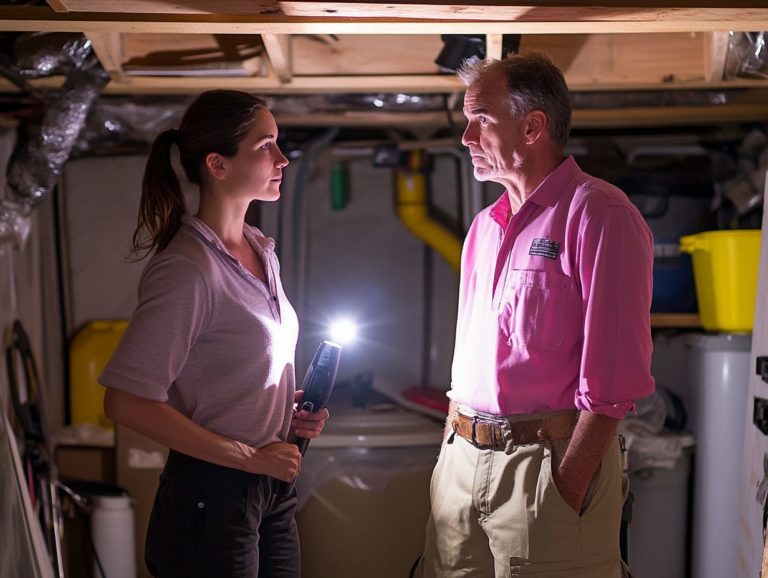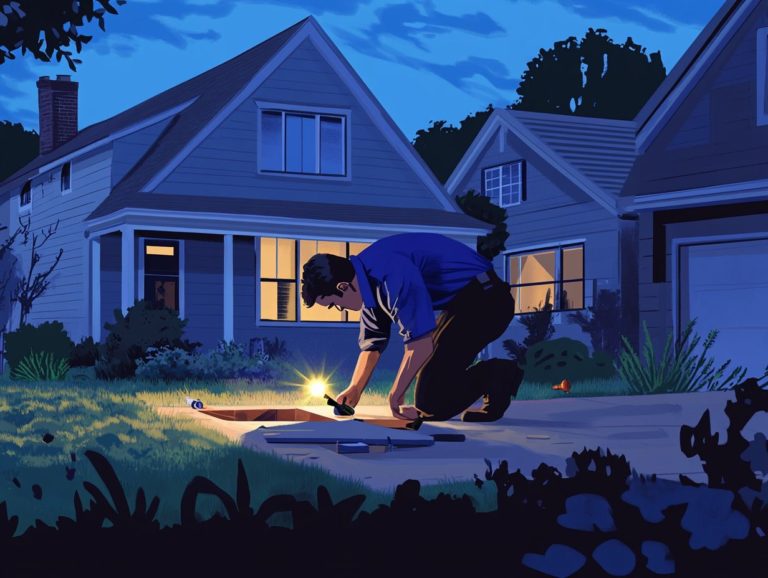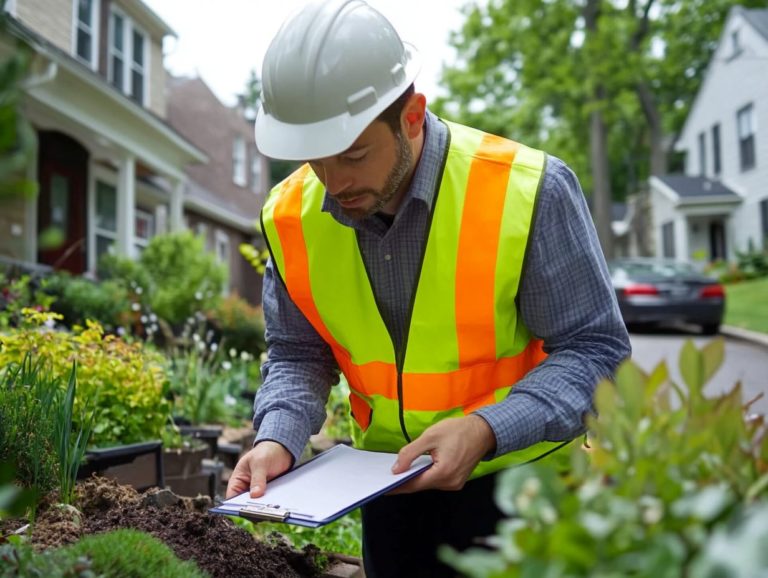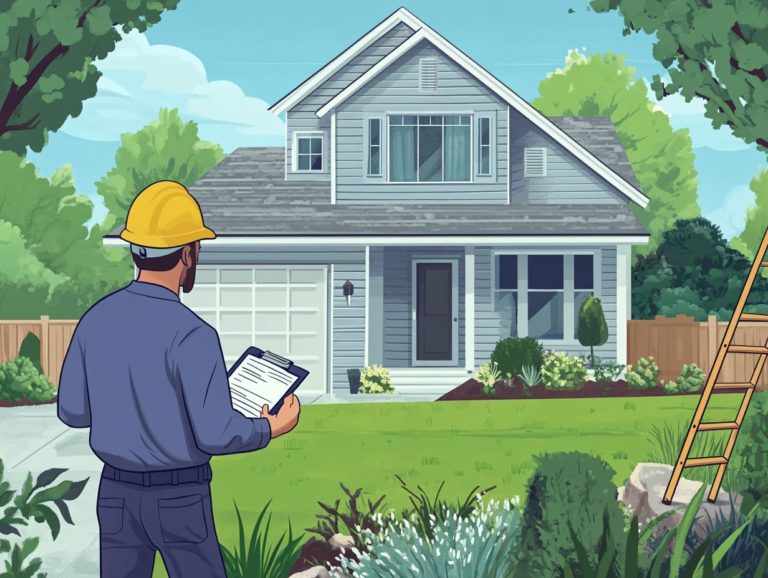Understanding the Home Inspection Process: What to Expect
Buying or selling a home can feel like navigating a labyrinth. One of the most pivotal steps along the way is the home inspection. This thorough check-up not only identifies potential issues but also provides peace of mind for both buyers and sellers.
In this article, you ll discover what a home inspection involves, why it s essential, and what to expect throughout the process. From common problems you might encounter to tips for preparation and insights into understanding the inspection report, you ll find guidance designed to ensure a seamless experience.
Whether you re stepping into the market for the first time or you re a seasoned seller, this information will prove invaluable in empowering you to make well-informed decisions.
Contents
- Key Takeaways:
- What is a Home Inspection?
- Why is a Home Inspection Important?
- What to Expect During a Home Inspection
- Common Issues Found During a Home Inspection
- How to Prepare for a Home Inspection
- Interpreting the Home Inspection Report
- Next Steps After the Home Inspection
- Frequently Asked Questions
- What is the purpose of a home inspection?
- When should I schedule a home inspection?
- Who conducts a home inspection?
- What should I expect during a home inspection?
- How long does a home inspection typically take?
- How long does a home inspection typically take?
- Will I receive a report after the home inspection?
- Who conducts a home inspection?
- What should I expect during a home inspection?
Key Takeaways:
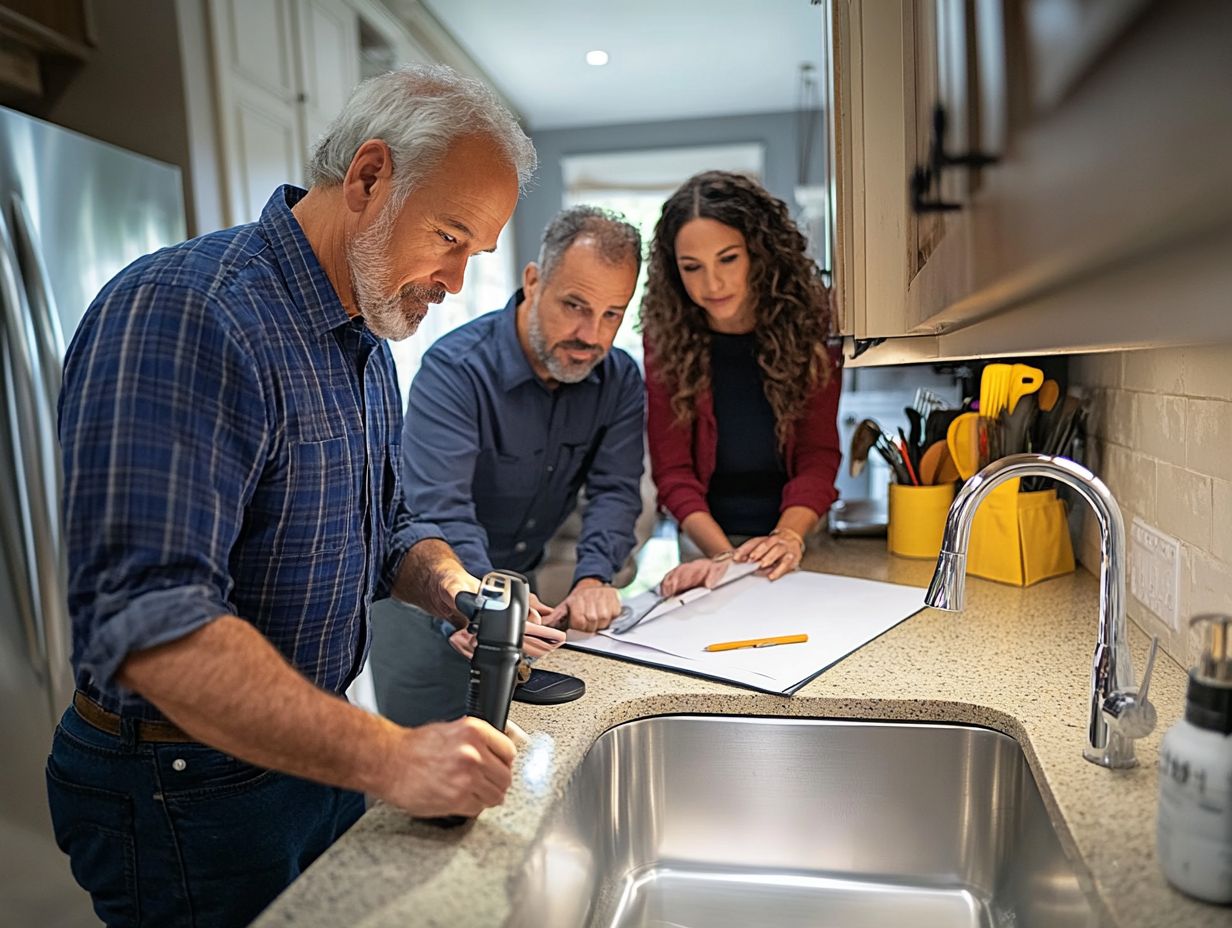
A home inspection is a detailed check-up of a property’s condition, providing a report on potential issues and necessary repairs.
A home inspection is crucial for both buyers and sellers, as it can reveal major problems and help negotiate the final sale price.
Be prepared for a step-by-step process, common issues found, and interpreting the report. For a comprehensive overview, check out understanding the home inspection timeline. Use the findings to negotiate repairs and close the deal with confidence.
What is a Home Inspection?
A home inspection is a detailed check-up of a property s condition, carried out by a qualified inspector, often affiliated with the American Society of Home Inspectors.
This essential assessment serves a dual purpose: it equips potential buyers with a detailed understanding of the home s physical state while also giving sellers valuable insights into any necessary repairs.
Typically, the inspection encompasses critical systems such as:
- Heating, ventilation, and air conditioning (HVAC)
- Plumbing
- Electrical systems
- Roof integrity
- Overall structural soundness
By arming both parties with this knowledge before the transaction, you ensure smoother and more well-considered choices.
Why is a Home Inspection Important?
A home inspection holds immense significance. It serves as your crucial opportunity to uncover serious issues within a property that may affect both the purchase price and your future safety.
For you as a homebuyer, it provides an essential layer of protection through the inspection contingency, enabling you to negotiate pricing and request necessary repairs or concessions from the seller.
A thorough home inspection can also impact the home appraisal process, ensuring that you feel confident in your investment. Act now to uncover serious issues before it’s too late.
What to Expect During a Home Inspection
During a home inspection, you can expect a thorough evaluation conducted by the inspector, who will meticulously examine critical components of the home. To learn more about the process, check out our guide on what to expect during a home inspection.
The inspector will use a detailed inspection checklist, which helps ensure that no important details are missed. It s highly advisable for you to attend the inspection; this allows you to observe firsthand how the inspector assesses the property s major systems, including the foundation, roof, plumbing, and HVAC system.
Knowing what to anticipate can significantly alleviate any concerns you may have about home inspection costs and help you understand the home inspector’s role, enabling you to make well-informed decisions.
Common Issues Found During a Home Inspection
Common issues that arise during a home inspection can vary widely, spanning from minor inconveniences to significant problems that demand immediate attention.
Inspectors often find serious problems like lead pipes, asbestos, radon, and termite infestations issues that can greatly impact both the safety and value of the home.
By being aware of these potential pitfalls, you not only safeguard yourself as a homebuyer but also enable sellers to tackle these challenges proactively before putting their property on the market.
How to Prepare for a Home Inspection
Preparing for a home inspection is essential for both sellers and buyers to ensure a seamless experience on inspection day, as highlighted in the article on understanding the importance of home inspections.
As a seller, you can take proactive measures, such as addressing minor repairs and ensuring the property is clean and accessible. These steps can significantly influence the outcome in your favor.
For buyers, being knowledgeable about what to look for and attending the inspection can deepen your understanding of the property’s condition. Familiarizing yourself with the role of home inspectors provides valuable insight that enables you to make informed decisions regarding your potential purchase.
Interpreting the Home Inspection Report
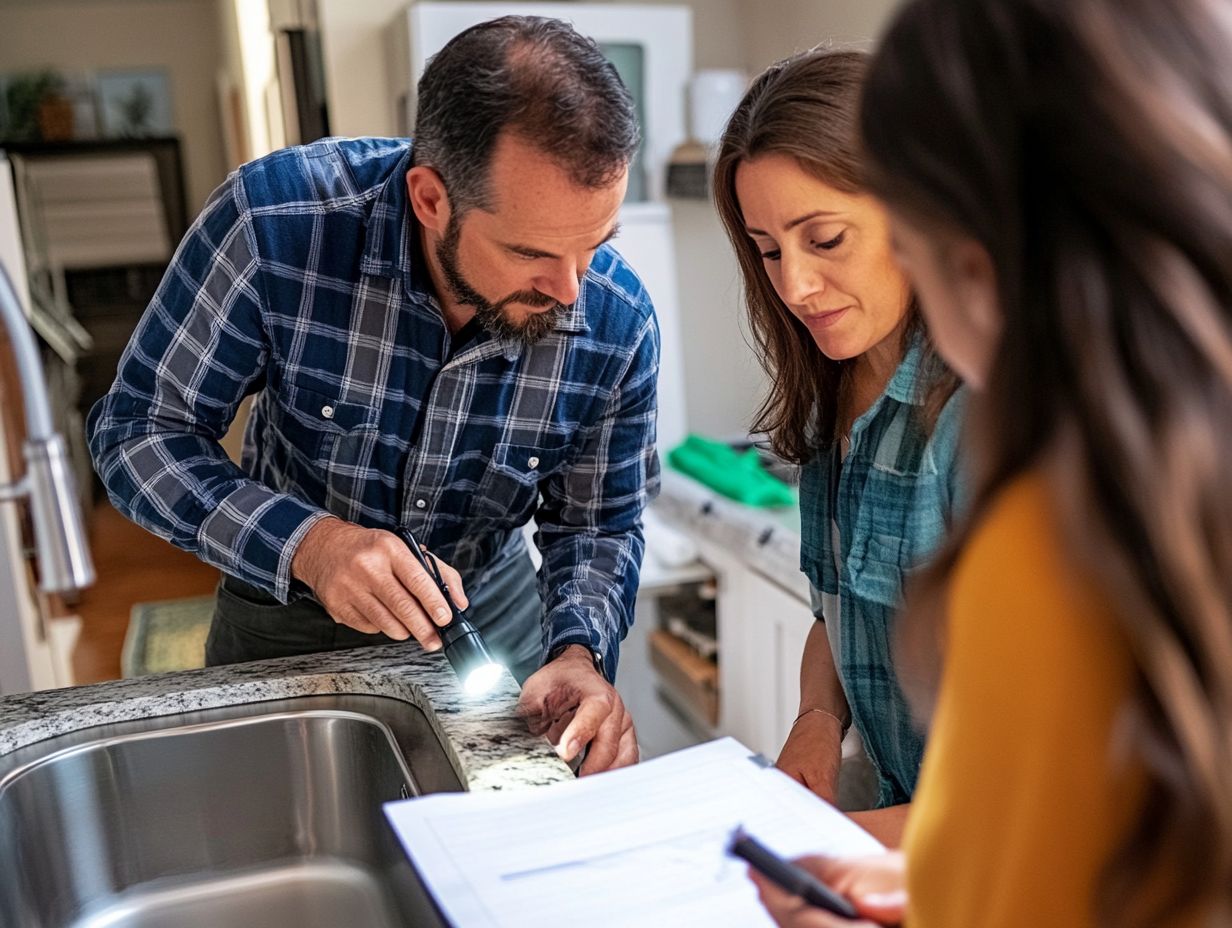
Understanding the home inspection report is vital for buyers and sellers alike. It highlights the inspector’s findings and identifies areas needing attention.
As a buyer, grasping the importance of each finding is key. This includes everything from minor repairs to major issues, allowing you to negotiate prices effectively.
This report fosters transparency and clarity between both parties during the transaction.
Next Steps After the Home Inspection
After the home inspection, both buyers and sellers should take crucial next steps that can greatly influence the entire transaction.
As a buyer, carefully assess the inspection report. Negotiate necessary repairs with the seller or consider requesting credits for home warranty options.
Sellers should address highlighted issues swiftly to boost the property s appeal, facilitating a smoother path to successful ownership.
Benefits of Home Inspections for Buyers
Home inspections offer numerous benefits for buyers. They provide a crucial opportunity to uncover serious issues before finalizing the purchase.
These inspections enable you to negotiate effectively and make informed decisions based on the inspector’s findings. This ensures you invest in a property that is safe and sound.
By evaluating the home s structural integrity, electrical systems, plumbing, and potential environmental hazards, inspections significantly reduce the risk of unforeseen expenses.
Identifying critical issues early allows you to leverage this information to negotiate necessary repairs or price reductions, enhancing your bargaining position.
This proactive step guarantees peace of mind, enabling you to move forward with confidence and safeguard your future investment.
Benefits of Home Inspections for Sellers
For home sellers, conducting a home inspection before listing can be a savvy strategy. It helps pinpoint and resolve serious issues right from the start.
This proactive approach lets you tackle repairs early and boosts your home’s appeal, potentially sidestepping buyer negotiations later.
Taking this step allows for repairs to be completed before buyers view your property. This groundwork can lead to a more favorable selling price.
With clear information about your home’s condition, you can confidently present your property, minimizing price negotiations driven by buyer concerns.
A certified inspection report shows you ve prioritized your home s integrity, instilling confidence in prospective buyers. This assurance can lead to smoother transactions and quicker sales while keeping market dynamics in your favor.
Home Inspection Checklist
A home inspection checklist outlines key areas an inspector will assess. This includes the foundation’s structural integrity, HVAC and plumbing systems, electrical elements, and roofing components.
This checklist helps buyers understand what to anticipate and allows sellers to identify potential serious issues before the sale.
Focusing on vital components like insulation, windows, and drainage systems ensures every corner of a home is meticulously evaluated.
Each area carries significant weight; for instance, a thorough analysis of the roof can prevent future leaks, while checking the HVAC system can enhance energy efficiency.
Understanding these elements allows buyers to make informed decisions, while sellers can proactively tackle problems, increasing their property’s appeal. Using such a checklist is a strategic move in real estate transactions, fostering transparency and confidence throughout the process.
Common Myths About Home Inspections
There are several common myths surrounding home inspections that can mislead both home buyers and sellers about their true significance.
One prevalent myth is that a home inspection can uncover every serious problem. This is not always the case. Some issues may remain hidden or even emerge after the inspection is completed. Understanding the limitations of home inspections is crucial for you as a buyer or seller.
Many people mistakenly believe that an inspector can detect all potential issues, including hidden water damage or future maintenance needs. However, that s simply not the reality. Home inspectors conduct a visual examination, often constrained by accessibility and time limitations.
It’s essential for you to maintain realistic expectations about what an inspection can cover. Recognizing what to expect during a home inspection can lead you to make more informed decisions and prevent misunderstandings during the home buying or selling process.
Post-Inspection Follow-Up
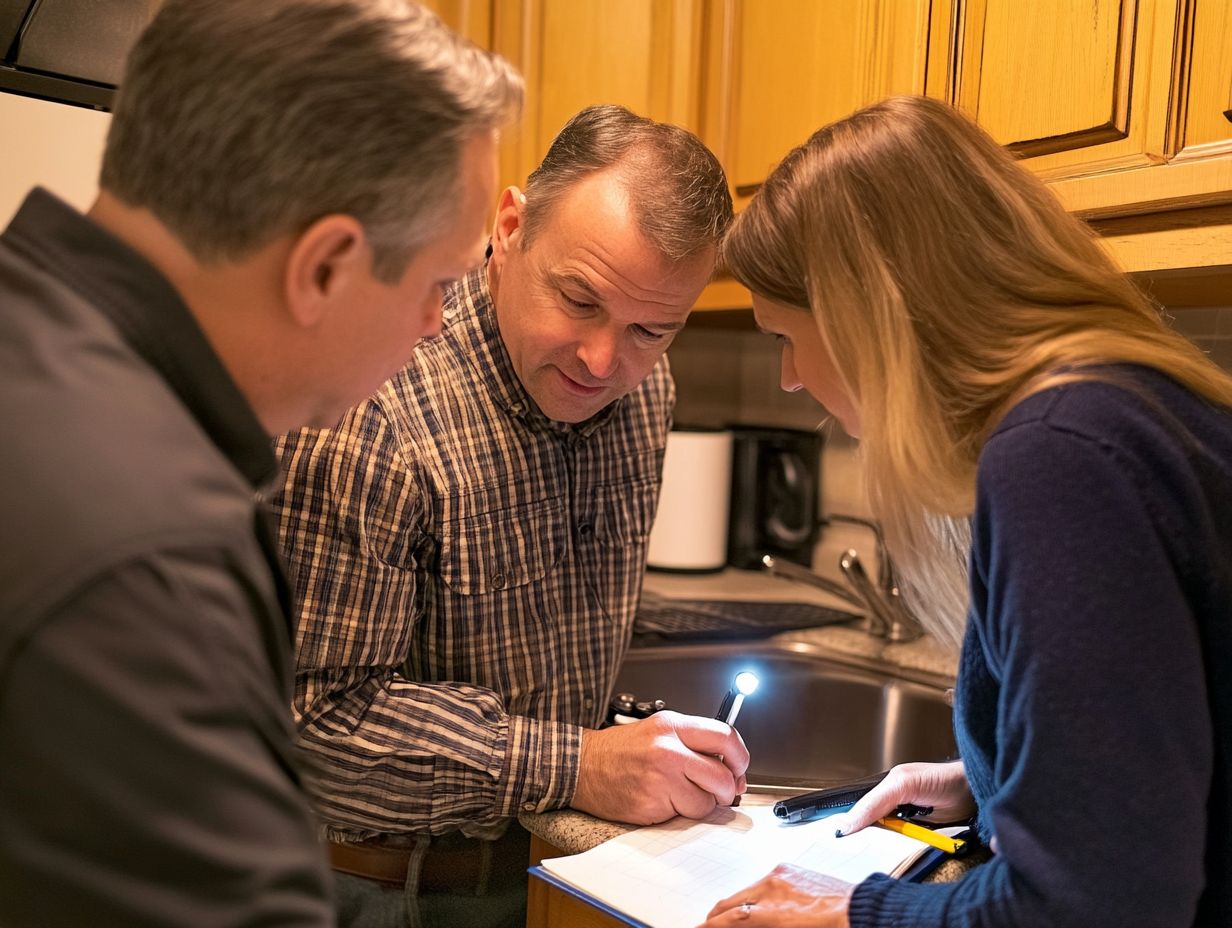
After the home inspection, there are some essential steps you should take as both a buyer and a seller. These are especially important when it comes to negotiating prices based on what was uncovered.
As a buyer, you might want to request repairs or credits. On the other hand, sellers should be ready to tackle any serious issues to keep the transaction moving smoothly. At this juncture, effective communication becomes paramount. Both parties are striving for an agreement that benefits everyone involved.
You may want to present a list of necessary repairs, complete with estimates to illustrate the potential costs. Conversely, sellers can showcase any recent major upgrades or improvements that might help ease concerns.
Prioritizing transparency and patience is key in this negotiation. Adjusting your expectations can pave the way to a win-win situation.
By collaborating and thoughtfully considering the inspection results, you can cultivate a cooperative atmosphere that leads to a successful transaction without unnecessary delays.
Legal Considerations
Legal considerations surrounding home inspections are vital in the transaction process, particularly regarding the inspection contingency a clause that allows buyers to back out if the inspection reveals major issues. As a home buyer, you should be fully aware of your rights and responsibilities concerning the findings.
Sellers, on the other hand, must ensure they accurately represent the property’s condition to avoid potential legal complications.
Understanding the nuances of disclosures is essential for everyone involved. Buyers depend on thorough inspections to uncover hidden issues. If critical information is withheld, sellers could find themselves facing legal repercussions.
This dynamic emphasizes the importance of clear communication throughout the sales process. Both buyers and sellers need to familiarize themselves with the specific contingencies in their agreements, as these can dictate the terms under which a deal may be renegotiated or canceled.
Neglecting these protocols can lead to disputes, making transparency not just beneficial but imperative for safeguarding against legal pitfalls.
Frequently Asked Questions
What is the purpose of a home inspection?
The purpose of a home inspection is to provide a detailed evaluation of a property’s condition, including its structural components, systems, and overall safety. This helps buyers make informed decisions about potential repairs and maintenance before finalizing a purchase.
When should I schedule a home inspection?
Schedule your home inspection right after signing the purchase agreement! This typically occurs during the contingency period, which allows the buyer to back out of the purchase if significant issues are found during the inspection.
Who conducts a home inspection?
Home inspections are typically conducted by certified and licensed home inspectors. These professionals have the knowledge and expertise to thoroughly examine a property and provide a detailed report of their findings.
What should I expect during a home inspection?
During a home inspection, the inspector will thoroughly examine the property, including its exterior, interior, structural components, and systems such as plumbing, electrical, and HVAC. To understand what to expect with a home inspection, they may also use specialized tools and equipment to assess the condition of the property.
How long does a home inspection typically take?
Home inspections usually take about 2 to 4 hours, depending on the size and condition of the property. It’s essential to allow enough time for the inspector to perform a thorough evaluation.
How long does a home inspection typically take?
The duration of a home inspection can vary based on the property’s size and condition. On average, it takes 2 to 4 hours. Larger or older properties may require more time.
Will I receive a report after the home inspection?
Yes! You will receive a detailed report after the inspection. This report includes a summary of the inspector’s findings and highlights any significant issues or areas of concern. Review the report carefully and discuss any questions with your real estate agent or the home inspector.
Who conducts a home inspection?
Home inspections are conducted by certified and licensed home inspectors. These professionals have the expertise to thoroughly examine a property and provide a detailed report of their findings.
What should I expect during a home inspection?
During a home inspection, the inspector will examine the property’s exterior, interior, structural components, and systems, such as plumbing, electrical, and heating, ventilation, and air conditioning (HVAC). To gain a clearer picture, it’s essential to understand the home inspection report, as they may use specialized tools to assess the property’s condition.


